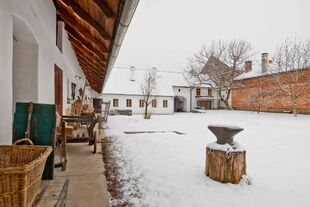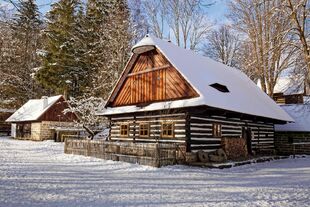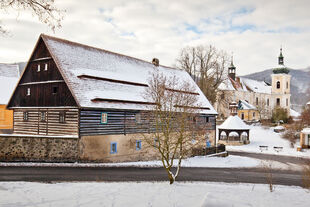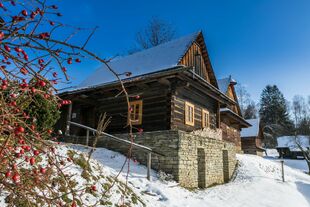The members of the club bought a conveniently located lot in the district of Prostřední Bečva where the first refuge was built in 1891 that was named Pústevňa in memory of the original hermitage which had been closed in 1784.
Very soon, however, the refuge was not able to cope with the increasing interest of the tourists and a new one, named Šumná, was built three years later. In the nineties of the nineteenth century Pustevny became a popular tourist centre. Pohorská jednota asked the Slovakian architect Dušan Jurkovič, who worked in Vsetín at that time, for co-operation in creating other buildings.
He designed and realized two more refuges in the style much influenced by the folk timbered architecture that might be named "folk secession". In 1898 Maměnka was built and one year later Libušín came into existence.
The interiors designed by Dušan Jurkovič were greatly impressive owing to the composition and the colour scale inspired by the folk art. It also contains pictures depicting historical scenes that were designed by Mikoláš Aleš. The nearby belfry also forms part of the set of buildings.
The houses had been functioning till the beginning of the nineties of the twentieth century, however, after the Second World War their technical condition started to deteriorate continually.
Demolition seemed to be the only solution, but in 1995 the declaration of the set of houses for a national monument was put through and the Wallachian open-air museum was charged with its management. The museum initiated a general repair and reconstruction of the buildings, arranged for the restoration of the interior decorations and provided replicas of the original furniture and lighting installations. As early as 1998 the restorers made an intervention in the decoration of the belfry and a year later Libušín and Pustevenka, and in 2003 still Maměnka, were opened to the public.Demolition seemed to be the only solution, but in 1995 the declaration of the set of houses for a national monument was put through and the Wallachian open-air museum was charged with its management. The museum initiated a general repair and reconstruction of the buildings, arranged for the restoration of the interior decorations and provided replicas of the original furniture and lighting installations. As early as 1998 the restorers made an intervention in the decoration of the belfry and a year later Libušín and Pustevenka, and in 2003 still Maměnka, were opened to the public.














